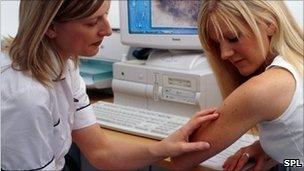Pill slows spread of skin cancer in half of cases
- Published

About 2,000 people in the UK die from skin cancer each year
A new drug for skin cancer can slow the spread of the disease in half of patients, thereby extending their lives, a study says.
A trial of 680 patients at the Royal Marsden Hospital, London tested a drug that attacks a genetic mutation found in half of all skin cancer cases.
The drug was effective on patients with advanced malignant melanoma.
The study has been welcomed by Cancer Research UK, but not yet published for review by other cancer specialists.
Dr Lesley Walker from Cancer Research UK, said she hoped that the drug would become available to patients quickly:
"There are very few options for patients with advanced melanoma, so these results are really encouraging. The drug is not yet licensed and unavailable to patients not on a clinical trial, but we hope that these results will change this situation very rapidly."
Common cancer
Malignant melanoma is now the second most common cancer in young adults - aged 15-34 - in the UK. Rates of melanoma are rising faster than any other common cancer.
The cancer is treatable if caught early, but survival rates are low once the cancer spreads.
The new drug targets a specific faulty gene - the mutated BRAF protein. This is present in around half of all melanoma cases.
The drug, called RG7204 seeks out and blocks the mutated gene. It caused tumours to shrink in 70% of cases.
The study has not yet been fully published for other cancer experts to review and researchers have not disclosed how much longer patients taking the new drug lived.
However, they said it was significantly longer than those taking standard chemotherapy.
'Incredibly exciting'
Dr James Larkin, from the Royal Marsden Hospital said it was an "incredibly exciting" development, adding:
"These results will be applicable to about 1,000 patients a year in Britain".
The drug has not yet been licenced so is available only to patients enrolled in a clinical trial.
Discussions on licensing the drug will begin after the results from the trial have been presented at a conference later this year.
- Published19 January 2011